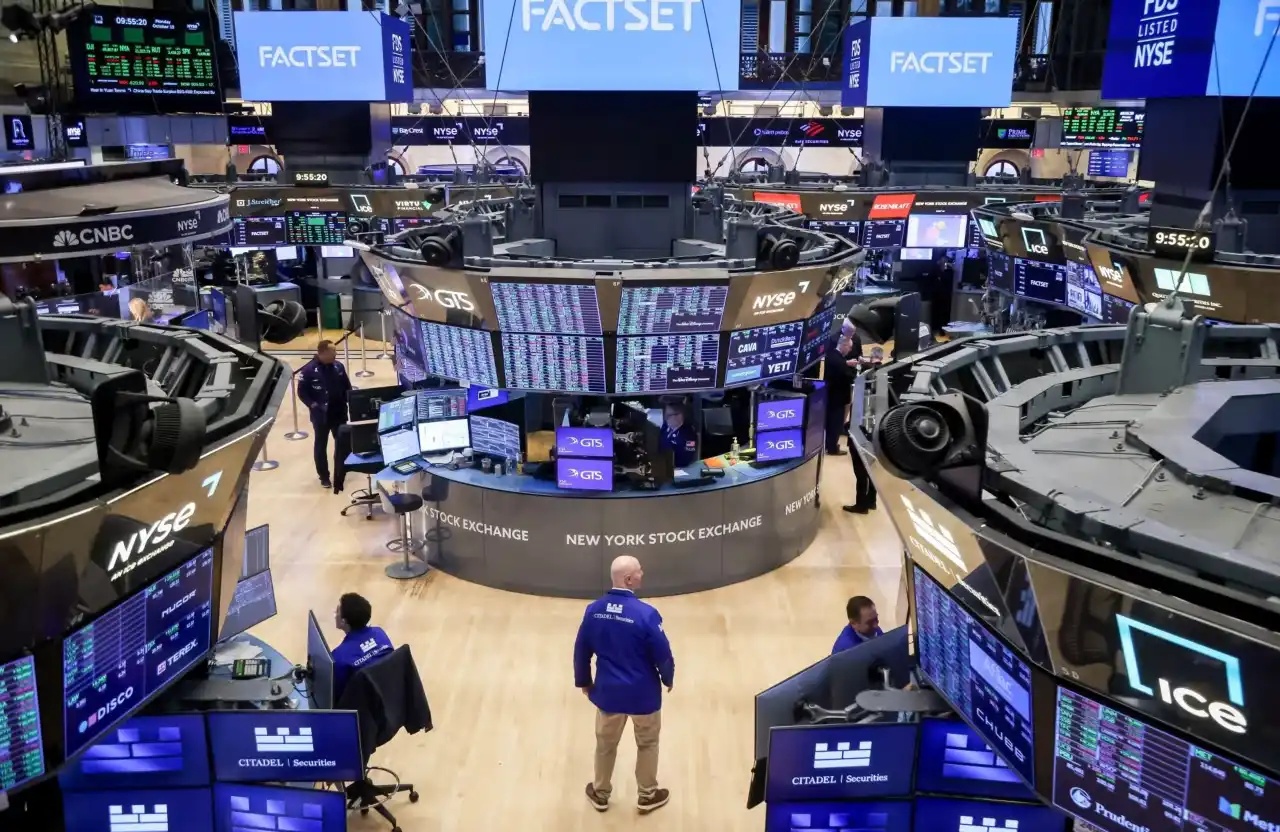《The Social Network》's unluckiest Winklevoss twins, went all in on crypto.
Following Bullish ringing the bell at the NYSE last week and becoming the second publicly traded cryptocurrency exchange platform in the United States, Gemini finally couldn't hold back. This platform, which has always emphasized "compliance," is now vying for the position of the third company to go public.

This time in the spotlight are the twin brothers who have already been written into American entrepreneurship textbooks—Tyler and Cameron Winklevoss. Over a decade ago, they made global headlines due to a lawsuit with Zuckerberg; ten years later, they became some of the earliest large-scale investors in Bitcoin amid the crypto wave.
Today, Gemini's public listing is not just a symbol of further "compliance" for the crypto CEX, but more like the Winklevoss twins regaining their stance in a new round of the American capital market. Lost in the social network era, gained in the crypto wave.

Image Source: Bloomberg
IPO Season: Gemini's Listing Sprint
According to the latest news, Gemini publicly filed a registration statement (Form S-1) with the U.S. Securities and Exchange Commission (SEC) on August 15, 2025, intending to list on the Nasdaq Global Select Market under the ticker symbol GEMI. Prior to this public filing, Gemini had also submitted a confidential IPO application in February 2025.
According to the documents submitted by Gemini: Gemini chose to go public through a traditional IPO, with Goldman Sachs and Citigroup serving as lead underwriters, and other institutions such as Morgan Stanley and Cantor Fitzgerald participating in the underwriting team. However, the IPO prospectus has not yet disclosed the price range or specific share size. SEC approval is still pending, and the listing date is undetermined.
Renaissance Capital estimates that Gemini's IPO could raise approximately $400 million. In addition, the company has secured a credit line of up to $75 million from Ripple, aimed at enhancing liquidity through the RLUSD stablecoin but has not been utilized yet.

It is worth noting that Gemini is currently experiencing financial challenges. According to its S-1 filing, for the six months ending in June 2025, the company had generated $68.6 million in revenue but faced a net loss of $282.5 million, significantly higher than the $41.4 million loss in the same period last year. Transaction fees remain the primary revenue source, accounting for about 66% of the total revenue in the first half of 2025. Additionally, Gemini also provides services such as custody, staking, and the issuance of the stablecoin GUSD.
Moreover, this IPO comes at a time when the U.S. IPO market is seeing a resurgence, especially with numerous digital asset companies going public. Circle (a stablecoin issuer) and Bullish (a crypto exchange platform) recently completed their listings a few months ago and last week, respectively. Coinbase has also been added to the S&P 500 index, boosting market acceptance of compliant trading platforms.
The Wall Street's Most Synced Twins
However, compared to Gemini itself, the story of the two founders may be even more intriguing.
In the summer of 1981, Tyler and Cameron Winklevoss were born into an academically and financially well-off family. Their father, Howard, was an actuarial science professor at the Wharton School of the University of Pennsylvania and also an investor. The brothers grew up in Greenwich, Connecticut, a quiet town where the affluent reside, with neatly trimmed lawns and yacht docks as daily views.

Winklevoss Brothers with their Father
The Winklevoss brothers in their youth were almost the epitome of perfection: excellent grades, impressive appearance, and boundless energy. They self-taught themselves programming and could tinker with websites at the age of thirteen or fourteen. They also took turns playing guitar and drums in a band. Their mother always said that they were mirror images from birth: the same blue eyes, the same high cheekbones, and even their cries carried a synchronized rhythm.
Their subsequent youth trajectories almost entirely overlapped: undergraduate economics studies at Harvard University, further education at the University of Oxford, and that legendary rowing career that made sports history. At Harvard, they were the backbone of the rowing team, known as the "God Squad" by their teammates for their synchronized rowing strokes.


Winklevoss Brothers Rowing
In 2008, they represented the United States at the Beijing Olympics in the men's pair rowing event, ultimately finishing in sixth place. Despite not winning a medal, their long hours of synchronized breathing, unified muscle movements, and shared determination on the water laid the foundation for their future collaborative entrepreneurial endeavors.
Entanglement with Zuckerberg
During their junior year at Harvard, they launched a campus social networking site called HarvardConnection. This was an idea they had long envisioned: consolidating Harvard students' profiles, photos, and social connections onto a single platform as a new form of social interaction.
This idea later evolved into their entanglement with Mark Zuckerberg.
The brothers were originally stars in the rowing team, excelling at propelling their oars into the water, but they were equally passionate about technology. However, not being top-notch programmers themselves, they recruited a fellow student, Divya Narendra, to help plan the website development. In this process, they found a sophomore student to assist with coding—his name was Mark Zuckerberg.
The unfolding of the story was more dramatic than fiction. Initially, the brothers had high hopes for Zuckerberg, believing he could help complete the core functionality of the website. However, weeks later, Zuckerberg's communication dwindled, and progress was nowhere to be seen. He always had various excuses: heavy coursework, system bugs, needing more time. Until one day, the brothers discovered that Zuckerberg had quietly launched a website called TheFacebook. The interface closely resembled what they had envisioned for HarvardConnection, only with a different name and domain.
Anger quickly turned into a legal battle. In 2004, the brothers and Narendra jointly sued Zuckerberg, accusing him of stealing their idea and source code. The litigation process was protracted, during which Zuckerberg's Facebook aggressively expanded, becoming one of Silicon Valley's hottest companies.
This entangled story was also brought to the silver screen in the movie "The Social Network."
In 2008, they settled for $65 million, including a significant amount of Facebook stock. In that moment, they became known as the "ones who lost out on Facebook." However, fate often enjoys a plot twist: a few years later, this money became their ticket to enter the world of cryptocurrency.
In 2012, they first heard about Bitcoin. At that time, few people truly understood the technology, but the brothers keenly sensed its potential. A portion of their settlement funds was used to purchase Bitcoin, accumulating up to 70,000 coins at one point, about 1% of the total supply. What was then just a small bet is now a legendary fortune worth billions of dollars.
Some jokingly say that if it weren't for that entanglement with Facebook, perhaps Gemini wouldn't exist today.
In 2014, Gemini was born. The brothers decided not to be the ones who "missed out on Facebook" and instead firmly grasp the direction in this wave of technology. Unlike the wild-growing, grey-area-wandering exchanges of the time, Gemini embraced regulation from the start, applying for the New York State Department of Financial Services (NYDFS) trust license and strictly aligning with Wall Street's compliance standards. The brothers even introduced a daily Bitcoin auction mechanism, mimicking NASDAQ-style trading rules, hoping to reassure institutional investors to join the space.
The division of labor between the brothers also became increasingly clear. Tyler leaned more towards internal affairs and strategy, excelling in management and meticulous execution, while Cameron was the spokesperson, more willing to appear in public and tell Gemini's story. One inside and one outside, their roles were distinct, with an almost instinctive understanding.
Compared to Binance and OKX, Gemini did not experience "explosive" growth; compared to Coinbase, Gemini lacked a bit of Silicon Valley-style engineering romance. Their label has always been "compliance-oriented," always appearing in suits at congressional hearings and in media interviews, emphasizing that cryptocurrency needs institutionalization and legal protection.
Today, according to Bloomberg's estimates, the brothers each hold over 5% of Gemini's shares, with individual net worth reaching $7.5 billion, totaling $15 billion in wealth. Their names are no longer just part of the story of their feud with Zuckerberg but deeply tied to the rise of Bitcoin and compliant trading platforms.
A once-failed situation was turned around by another wave of technology.
Welcome to join the official BlockBeats community:
Telegram Subscription Group: https://t.me/theblockbeats
Telegram Discussion Group: https://t.me/BlockBeats_App
Official Twitter Account: https://twitter.com/BlockBeatsAsia












